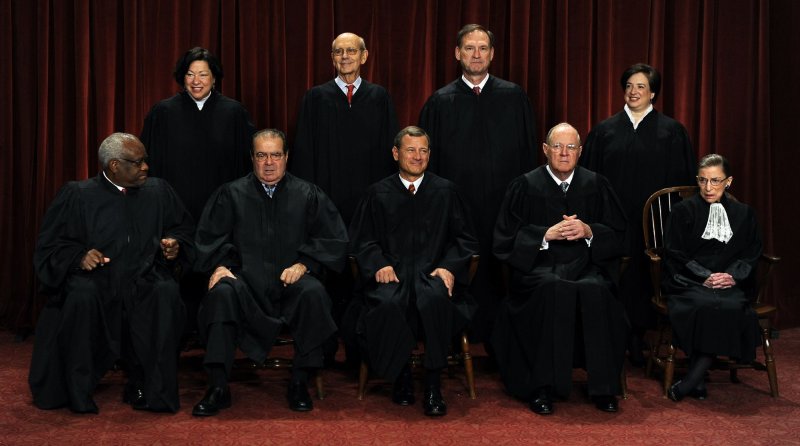The Supreme Court Justices of the United States sit for a formal group photo in the East Conference Room of the Supreme Court in Washington on October 8, 2010. The Justices are (front row from left) Clarence Thomas, Antonin Scalia, John G. Roberts (Chief Justice), Anthony Kennedy, Ruth Bader Ginsburg; (back row from left) Sonia Sotomayor, Stephen Breyer, Sameul Alito and Elena Kagan, the newest member of the Court. UPI/Roger L. Wollenberg |
License Photo
WASHINGTON, Jan. 10 (UPI) -- Two U.S. Supreme Court justices issued an opinion Monday saying the rest of the court was ignoring court precedent that curtails congressional power.
The dissent was important because it may signal some changes in the high court's approach to the commerce clause, the constitutional authority for Congress to regulate interstate commerce, SCOTUSBLOG.com reported. The clause was cited by Congress as the authority in enacting healthcare reform, and is central to several court challenges to the healthcare reform law.
The dissenting opinion came as the full court rejected review of a challenge to congressional authority in a 2002 law. The law makes it a felony for a convicted criminal to possess a bulletproof vest or body armor that had been taken across state lines.
A federal appeals court had rejected a challenge by Cedrick Alderman of Seattle, who had been convicted of having a bulletproof vest despite being earlier convicted of a violent crime. The Supreme Court rejected review of the appeals court action.
Justice Clarence Thomas, largely joined by Justice Antonin Scalia, said in dissent that the majority was ignoring a number of Supreme Court precedents that curtail Congress's use of the commerce clause, especially 1995's Lopez vs. U.S., which struck down a ban on firearms near schools.
"Today the (Supreme) Court tacitly accepts the nullification of our recent commerce clause jurisprudence," Thomas wrote in the dissent. He said the appeals court allowed a 33-year-old Supreme Court ruling on a statute to gut recent high court constitutional rulings.
"That logic threatens the proper limits on Congress's commerce power and may allow Congress to exercise police powers that our Constitution reserves to the states," he wrote.















